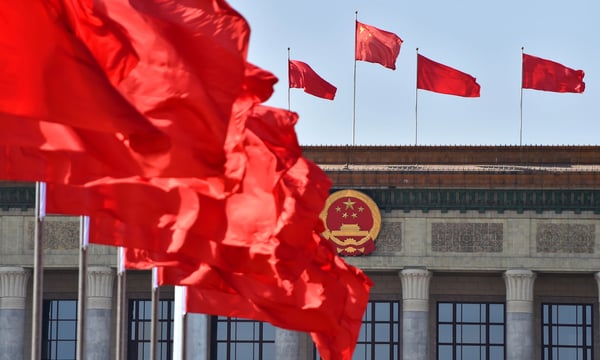On May 12, China’s State Council Information Office released a white paper on “National Security in the New Era” – an extensive document that outlines China’s evolving security policy in a world the government characterizes as unstable and volatile. It’s not hard to understand why, given the heightened global uncertainty in the Asia-Pacific region, marked by changing power equations, technological competition, and ongoing flashpoints from the Taiwan Strait to the South China Sea.
The white paper presents the idea of a “holistic security” approach to national security that includes politics, economy, military, science and technology, and societal domains under the leadership of the Chinese Communist Party (CCP). Even though the document seeks to present China as a source of stability in the Asia-Pacific, the sections on sovereignty, ideological resilience, and systemic risk management raise important questions about the implications for regional trust, global governance, and domestic freedom.
The “holistic” approach to national security is a framework first articulated by Xi Jinping. It expands the traditional idea of security to cover nontraditional security threats emerging from cyberspace, artificial intelligence, biosecurity, public health, etc. This approach declares the “people’s security” as the final aim, in order to approve citizens’ sense of “fulfilment, happiness and security.” But it strongly prioritizes “political security as the fundamental task” – referring to upholding the CCP’s absolute leadership and the socialist system – and national interests as the guiding principle.
This emphasis on political security is accompanied by an appeal for China to modernize its legal and institutional structures. The white paper highlights the recent laws introduced, covering cybersecurity, data protection, counterterrorism, etc., as part of its efforts to build a strong security shield against “black swan” (unpredictable) and “grey rhino” (high-probability) risks that could disrupt China’s modernization. It also prioritizes technological self-reliance, calling for investment in key infrastructure and indigenous innovation to minimize exposure to foreign sanctions or supply chain disruption.
Another major theme is the interplay of security and development. The white paper points out that “high-quality development” cannot be realized without “high-level security” and vice versa. It therefore positions economic resilience as an integral aspect of national stability, both as an end and as a means. This approach highlights China’s dual strategy of expanding domestic consumption while restricting cross-border data flows, foreign investment, and academic exchanges, all in the name of national security.
The document also highlights China’s Global Security Initiative (GSI), proposed by Xi in 2022, which advocates for shared security and multilateralism while opposing “bloc confrontations” and generalization of security by Western powers. The GSI positions China as a defender of the Global South and as an alternative to U.S.-led coercion. The white paper declares China’s commitment to both its own security and the common security of the region and the world, by emphasizing cooperation on non-traditional threats such as climate change, pandemics, and cybercrime.
Regarding the Asia-Pacific, however, the white paper reveals mixed notions. It declares that China’s sovereignty, territorial integrity, and development interests are non-negotiable, especially in the cases of Taiwan, Hong Kong, Xinjiang, Tibet, and maritime rights.
China pledges to “inject stability” into regional affairs through economic partnerships and dialogue on one hand, citing Beijing’s role in maintaining overall peace despite territorial disputes in the South China Sea and tensions with Japan over the East China Sea. On the other hand, its portrayal of external pressures as existential threats, including accusations of U.S. containment and support for Taiwan’s separatist forces, could escalate distrust among neighbors already cautious of Beijing’s assertiveness.
Although the white paper highlights China’s “social harmony” and low crime rates as evidence of effective governance, its broad definition of security raises questions regarding legal transparency and human rights. Including security agencies in the legislation process of technological and economic policies may enable state surveillance and censorship in the name of risk prevention. Similarly, despite international criticism of China’s policies in Xinjiang and Tibet, the white paper’s emphasis on “ethnic unity” and “religious harmony” may indicate a continued reliance on coercive measures.
The world will be watching to see if Beijing’s implementation of its “holistic security” doctrine promotes true stability, as China claims, or if it is a fig leaf for the CCP extending power overseas and reinforcing control at home, as its critics allege.






